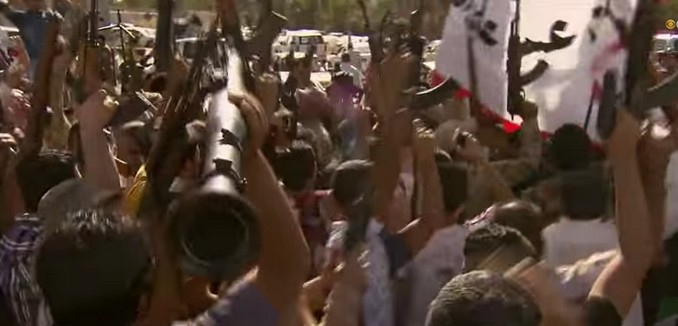In a report Thursday, the United Nations revealed that over 5,500 Iraqis have been killed since an Islamic State of Iraq and Syria (ISIS) offensive started in June.
According to The New York Times:
Those deaths represent nearly half of the 9,343 civilians killed in Iraq from January through September, the United Nations said in a joint report by its mission in Iraq and its human rights office in Geneva, emphasizing that the figures were “absolute minimums.” The total casualty count for the year so far, including wounded, is at least 26,000. …
The accounts of atrocities were not limited to the Islamic State, a Sunni militant group also known as ISIS or ISIL. Iraqi government security forces and militias associated with them have also committed “gross violations” of international law, abducting civilians and hanging their bodies from lampposts in Baquba, summarily killing captured Islamic State fighters and launching airstrikes that resulted in “significant” civilian deaths and injuries, according to the report.
Writing in Foreign Policy, Phillip Smyth, added that many of the Shiite militias associated with the Iraqi government have strong ties to Iran:
Armed men posing with severed heads, massacres of mosque-goers during Friday prayers, massive reliance on transnational jihadists — these are crimes that are usually associated with the Islamic State (IS). However, they’re also the actions of some of Iraq’s growing Shiite militia organizations, which are playing an increasingly prominent role in fighting the Sunni jihadists. These groups, many of which have deep ideological and organizational links to Iran, are sweeping away what is left of any notion of the Baghdad government’s authority — and represent a massive challenge to President Barack Obama’s stated goal of working with an inclusive Iraqi government to push back IS.
Over 50 Shiite militias are now recruiting and fighting in Iraq. These groups are actively recruiting — drawing potential soldiers away from the Iraqi army and police and bringing fighters into highly ideological, anti-American, and rabidly sectarian organizations. Many of these trainees are not simply being used to push back Sunni jihadists, but in many cases form a rear guard used to control districts that are supposedly under Baghdad’s control.
The role Iran has played in fomenting the violence in Iraq led one expert to tell The Jerusalem Post that “Iran is part of the problem and not the solution in the fight against Islamic fundamentalism.”
The alliance between Iran and Iraq is not one sided. In Do ‘Syria,’ ‘Iraq’ and ‘Lebanon’ Still Exist?, which was published in the February 2014 issue of The Tower Magazine, Jonathan Spyer recounted how Iraq became a vital conduit for Iran’s support of Syria:
Iraq has also played a vital role in supporting Assad, mainly by allowing Iran to use Iraqi territory and airspace to transfer weapons to Syrian forces. At first glance, this appears to be a strange policy. Relations between Iraq and Syria prior to the civil war were not good, with Maliki openly accusing Assad of supporting Sunni insurgents. But this has now changed. Indeed, Maliki has openly supported Assad since the beginning of the Syrian civil war. This reflects his increasing closeness to Iran, which helped ensure Maliki’s emergence as prime minister after the 2010 elections and pressured Assad to support him as well. Relations between Iraq, Iran, and Syria have only improved since.
In addition to government support, Iraqi Shia militias are now fighting in Syria on behalf of Assad. The Abu Fadl al-Abbas Brigades, Ktaeb Hezbollah, and the Ahl al-Haq group all have forces in Syria. They are playing an important role, given that one of Assad’s major weaknesses is his lack of reliably loyal soldiers. The eruption of violence in Iraq’s western Anbar province has further cemented this alliance, since the insurgency is a direct result of advances made by Sunni jihadis in Syria.
[Photo: CBS This Morning / YouTube ]




